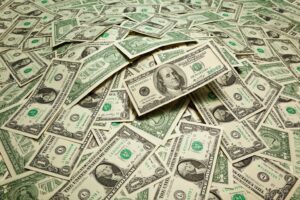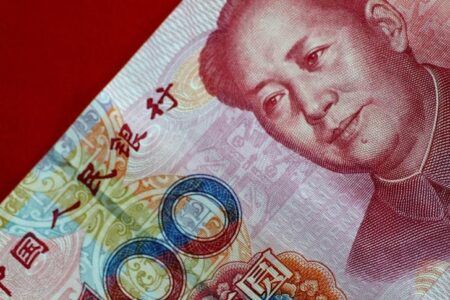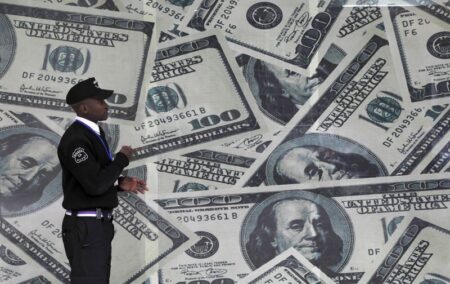By Samuel Indyk and Ankur Banerjee
LONDON (Reuters) -The dollar was steady on Monday as investors took stock of U.S. economic data ahead of the Federal Reserve policy meeting this week, while escalating geopolitical tensions in the Middle East kept a lid on risk sentiment.
The , which measures the U.S. currency against six rivals, was little changed at 103.53 on Monday and remained close to the six-week high of 103.82 it touched last week. The index is set for a 2% gain in January as traders temper expectations of early and deep U.S. interest rate cuts.
The Fed in December surprised markets by taking a dovish tilt, resulting in traders pricing in aggressive easing, with a cut expected as early as March.
But since then, strong economic data and pushback from central bankers have prompted traders to adjust expectations. Markets are currently pricing in a 49% chance of a rate cut in March, the CME FedWatch tool showed, compared with an 86% chance at the end of December.
“Speculation about the near-term path for interest rates continues to be the dominant factor driving financial market moves,” said Lloyds (LON:) Bank economist Nikesh Sawjani.
“The Fed currently faces a U.S. economic picture that sees economic activity still holding up better than expected even though inflation measures continue to move down. That hardly suggests that the economy urgently needs rate cuts.”
Data on Friday showed U.S. prices rose moderately in December, keeping the annual increase in inflation below 3% for a third straight month.
Investor attention this week will squarely be on the Federal Reserve’s policy announcement on Wednesday, with the central bank widely expected to stand pat on rates, leaving the spotlight on Fed Chair Jerome Powell’s comments.
“We do not expect the Fed to rush on rate cuts at this meeting, which is likely to keep the USD firm across the board,” said Roberto Mialich, global FX strategist at UniCredit Bank.
The euro was down 0.1% at $1.0838, and was headed for a near 2% decline in the month. The European Central Bank last week held interest rates at a record-high 4% and reaffirmed its commitment to fighting inflation.
Traders though are piling on bets that the ECB will cut interest rates from April, with nearly 140 basis points of easing priced in for the year.
ECB Vice-President Luis de Guindos said on Monday the central bank will cut interest rates sooner or later given recent inflation developments in the euro zone.
Sterling last bought $1.2703, flat on the day ahead of the Bank of England’s policy announcement on Thursday.
The Japanese yen strengthened to 147.865 per dollar, but is on course for an almost 5% decline in January, its weakest monthly performance since June 2022, as traders temper their expectations of when the Bank of Japan would exit from its ultra-loose policy.
“Towards the end of December we saw positioning become net long JPY – perhaps fueled by expectations for both, aggressive Fed easing, as well as rapid BOJ policy normalization,” said Sid Mathur, head of Asia macro strategy and emerging market research at BNP Paribas (OTC:).
“But both those expectations have been scaled back over the past couple of weeks, and the BNPP positioning indicator suggests that those JPY longs have also been reduced.”
On the geopolitical front, investors are also wary of growing risks after three U.S. service members were killed in an aerial drone attack on U.S. forces in northeastern Jordan near the Syrian border.
The geopolitical ructions could provide the safe-haven yen a temporary lift, analysts said.
Read the full article here












